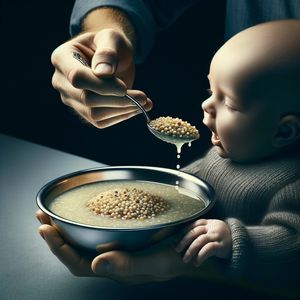OLD IS GOLD; sometimes, silver is also gold. Especially when it concerns our babies and their meals. In many Indian homes, newborns are fed their first solids (and meals thereafter) from silver cups, plates and glasses. But the easy availability of plastic and silicone cutlery has edged out usage of silverware amid fears of metal poisoning in infants and the issues surrounding maintenance of silverware. But is silverware harmful for babies? Not at all! In fact, it might be the best thing for your baby.
Extensive research conducted with metal experts and toxicologists for my book—For Bumpier Times—revealed that silverware is in fact very ideal for serving food to both children and people with infections. This is because silver metal is oligodynamic by nature, which allows it to kill several disease-causing microorganisms.
One cannot know for certain if our ancestors used silverware as a sign of wealth or knew about the metal's pathogen-killing properties. But written records and accounts have shown that the use of silverware has been on for several generations across the world.
Phoenicians and early settlers in the Americas dropped silver and copper coins into urns of water to make it suitable for drinking. To this day, treatment of drinking water in many poor countries and modern purifying systems still involve the usage of silver salts. The metal’s pathogen-killing property also finds use in surgical dressings and disinfectants.
Any apprehension over using silverware for babies can be safely dismissed. The body can absorb silver only in the form of soluble salts and not in the form of the metal itself. So there is no harm done to the baby by serving food in a silver plate or bowl. However, if the food in the silverware is too acidic, silver ions can leach into the food. If this happens, no real harm can be caused to the human body as the amount leached into food is negligible. To be extra safe though, fill the plate or cup with food just before feeding the child.
Some doctors are of the opinion that giving silverware (at least the spoon) a total miss might not be such a bad idea. This is because plastic or silicone spoons can be chewed upon and thus provide greater relief to teething gums. A silicone spoon also causes lesser pain if accidentally jabbed against the mouth or gums of a fussy toddler. Also, food-grade plastic or silicone ware come in a range of attractive colours and designs that might be more efficient at getting a fussy child to swallow his or her food. But if you have any reservations about using your grandmother’s silver cup or plate for your child, now is the time to shed them!


